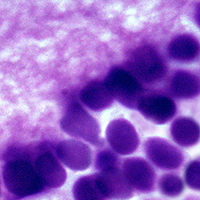The possible alleviating effect of garlic supplement on the neural retina in a rat model of hypercholesterolemia: a histological and immunohistochemical study

All claims expressed in this article are solely those of the authors and do not necessarily represent those of their affiliated organizations, or those of the publisher, the editors and the reviewers. Any product that may be evaluated in this article or claim that may be made by its manufacturer is not guaranteed or endorsed by the publisher.
Accepted: 1 December 2021
Authors
The purpose of this work was to prove that oxidative stress is the main mechanism responsible for retinal neurodegenerative changes, subsequent apoptosis, and inflammatory cytokine release in rats fed with a high cholesterol diet (HCD) and determine the role of garlic in alleviating these changes. Forty rats were equally divided into four groups: control, garlic-treated (positive control), HCD, and HCD + garlic-treated (HCD + G). By the end of the experiment (24 weeks) blood samples were collected for assessment of serum lipid profile, oxidative stress parameters, and plasma levels of IL-6 and TNF-α. Both eyes of the rats were enucleated; one was used for light microscopic examination and the other for electron microscopic examination. There was a significant increase in the levels of serum lipids, oxidative stress parameters, IL-6 and TNF-α, and area of expression of caspase-3 in the HCD group compared to both the control and HCD + G groups. Histological examination revealed degenerative changes in all layers of the neural retina in the HCD group. Garlic administration resulted in a significant improvement in the biochemical, immunohistochemical, and histological characteristics of hypercholesterolemic rats. These findings support the hypotheses that garlic has strong antioxidant, anti-apoptotic, and anti-inflammatory properties. Garlic ameliorates the neurodegenerative changes in the neural retina of hypercholesteremic rats.
Department of Biochemistry, College of Medicine, Taif University, Taif, Saudi Arabia
How to Cite

This work is licensed under a Creative Commons Attribution-NonCommercial 4.0 International License.









